The past two weeks have been a whirlwind: classes ended, I had three papers and four finals, I went to Clear Creek Monastery for a few days, and four of our men were ordained deacons. As I make the transition from being in seminary to spending the summer at Holy Spirit Catholic Church, I wanted to share ten things that I learned this year:
The Liturgy of the Hours, also known as the Divine Office, is the prayer of the People of God for two reasons. First, because it is prayed for you. Priests make a public promise to pray these prayers daily for the Church. They’re not meant to replace private prayer, but to supplement it. Second, the laity are invited and encouraged to join in these liturgies, as well as to pray the Hours privately. The Catechism (CCC 1175), citing the Second Vatican Council’s Sacrosanctum Concilium, has this to say:
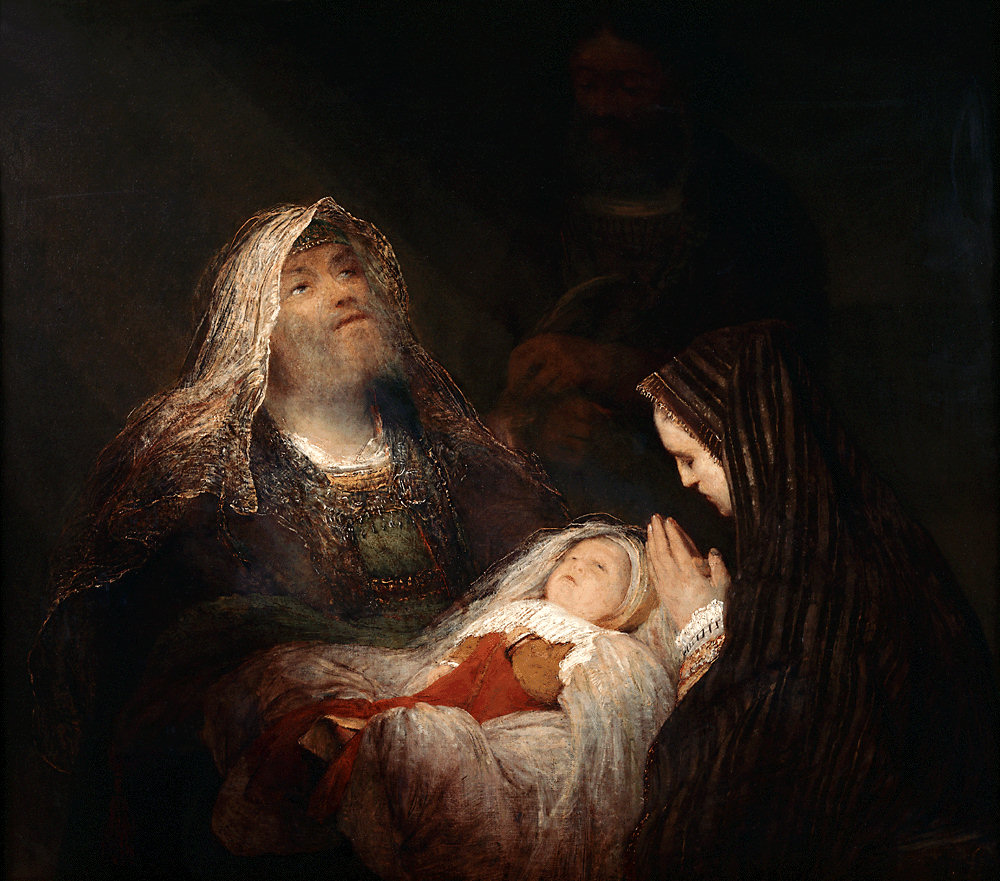 |
| Aert de Gelder, Simeon’s Song of Praise (1710) |
The Liturgy of the Hours is intended to become the prayer of the whole People of God. In it Christ himself “continues his priestly work through his Church.” His members participate according to their own place in the Church and the circumstances of their lives: priests devoted to the pastoral ministry, because they are called to remain diligent in prayer and the service of the word; religious, by the charism of their consecrated lives; all the faithful as much as possible: “Pastors of souls should see to it that the principal hours, especially Vespers, are celebrated in common in church on Sundays and on the more solemn feasts. The laity, too, are encouraged to recite the divine office, either with the priests, or among themselves, or even individually.”
- Invitatory: This isn’t a separate hour of its own. Rather, as DivineOffice.org explains, “The Invitatory is the introduction to the first hour said on the current day, whether it be the Office of Readings or Morning Prayer.” Traditionally, the invitatory Psalm is Psalm 95. Psalm 100, Psalm 67, or Psalm 24 may also be used, but I have never seen this done.
- Office of Readings: This is a major hour, and replaces Matins. After the hymn and three Psalms, there are two readings. The first is from Scripture, and the second typically comes from the Church Fathers or a Church Council. The second reading often serves as a commentary on the Scripture reading or the liturgical feast of the day. In all, Office of Readings takes about 15 minutes.
- Morning Prayer (Lauds): After the hymn and three Psalms, there is a short Scripture reading (usually only a couple verses long: just enough to give you something to reflect on), a short Responsory Prayer, the Canticle of Zechariah (the Benedictus, Luke 1:68-79), intercessions, the Our Father, and a closing prayer. Lauds also takes about 15 minutes.
- Daytime Prayer (Terce, Sext, None): These are minor hours, prayed at mid-morning, midday, and mid-afternoon. They are three short Psalms, a short reading from Scripture, and a closing prayer. Diocesan priests are only required to pray one of these. Monks and nuns will often pray all three. Traditionally, they are prayed at about 9 a.m., noon, and 3 p.m. (the third, sixth, and ninth hours: hence, the names). Each one takes about 5 minutes to pray.
- Evening Prayer (Vespers): The structure of Vespers is almost identical to Lauds, except that instead of praying the Canticle of Zechariah, you pray the Canticle of Mary (the Magnificat, Luke 1:46-55). It also takes about 15 minutes.
- Night Prayer (Compline): After reflecting on your day, you pray an act of contrition, followed by a hymn, one Psalm, a short Scriptural reading, the Canticle of Simeon (the Nunc Dimittis, Luke 2:29-32), and a closing prayer. Typically, this is followed by a Marian hymn.
 |
| Jan de Bray, David Playing the Harp (1670) |
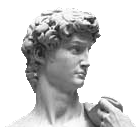 Why does Michelangelo’s David exist? Who or what caused it? According to the Greek philosopher Aristotle, our answer to that question should delineate four different types of causes: formal, material, efficient, and final. (Obviously, he didn’t address the David directly).
Why does Michelangelo’s David exist? Who or what caused it? According to the Greek philosopher Aristotle, our answer to that question should delineate four different types of causes: formal, material, efficient, and final. (Obviously, he didn’t address the David directly).
Materially, the cause is the marble. The formal cause is the shape of the statue: it’s David. Together, the form and matter of the statue are what give it its nature (as a marble statue of David). But the form and matter don’t tell the full story. We have to look to the efficient (or agent) cause: primarily, that’s Michelangelo. In a secondary sense, Michelangelo’s tools can also be described as efficient causes.
 |
| Let’s not even talk about the Royals right now. |
But there’s one more cause: the final cause. The final cause is the end, “that for the sake of which” the thing exists. In other words, the final cause is the goal, the motive of the action. Only if you ask why Michelangelo made the David can you fully understand the statues’ causes.
Final causality applies to all human activity. Take the example of a batter swinging at the first pitch of a baseball game. What’s his goal in swinging the bat? To hit the ball. But there’s a more final cause: he’s trying to hit the ball so that he can get on base. And he’s trying to do that so that he can score a run, and so on.
When you start to arrange the causes in these sorts of sequences, they begin to converge. So, for example, a batter not swinging at a pitch is the opposite action as the last example. But when you explore why the two batters swing (or don’t), you can see that they are pursuing the same goal: trying to get on base, score runs, win the game, etc. So these opposite actions are done for the same final ends.
If you were to arrange all human activity into these series of causes, you’d see them eventually converge at a single point: one goal which is desired only for its own sake (since if it’s done for the sake of something else, that something else is a further end). Aristotle describes this as perfect happiness, which he says can be achieved fully only in contemplating the Divine for eternity. For a pre-Christian pagan, that’s an incredible insight.
But this method is something we too rarely practice: we act without considering why we’re acting. Why work overtime, or own a car, or go on vacation? Why do anything at all? We need to have our goal in view, or our actions become (literally) pointless.
Philosophers like David Hume (1711-1776) and G. E. Moore (1873-1958) have posed what’s called the “is / ought” problem. In a nutshell, it says that prescriptive statements (what we ought to do or not do) can never be deduced from descriptive statements (describing what is).
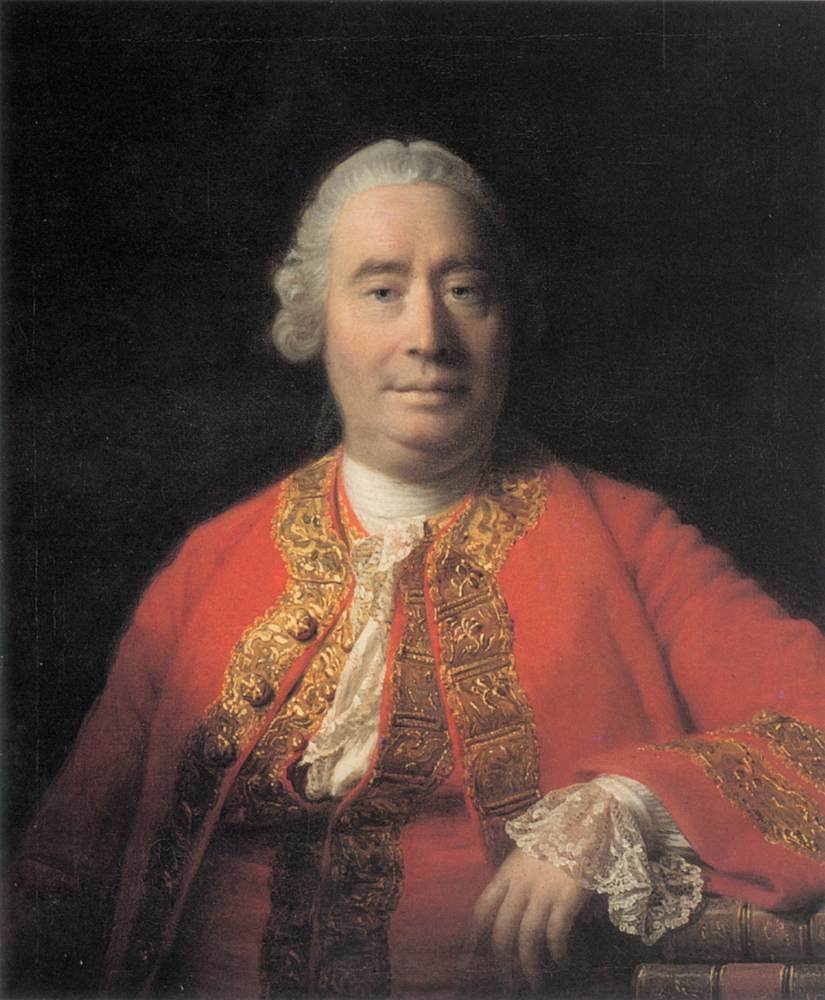 |
| David Hume |
So, for example, pointing out that the Final Solution was genocide is merely descriptive. According to Hume and Moore, this isn’t enough to prove that the Nazis shouldn’t have pursued it, since that’s a prescriptive judgment. The most we can say is that they shouldn’t have done it if some subjective condition was true. For example, they shouldn’t have done it if they wanted history to judge them well, or if they wanted to treat the Jews with respect, etc. But all of these conditions are prescriptions (we ought to want to treat the Jews with respect, etc.). So it appears that every moral system requires something to be added to the objective facts. This addition adds an arbitrary, or at least subjective, element, so we can’t describe any moral system as objectively true.
This argument appears strong, and it’s a dangerous one. If morality is something added to the objective facts, this would seem to show, in Hume’s word, that “the distinction of vice and virtue is not founded merely on the relations of objects, nor is perceived by reason.” Moore went even further, arguing that this showed that “anything whatsoever can be called good.” In this view, the terms “good” and “evil” come to mean nothing more than “agreeable (or disagreeable) to my subjective preferences.”
But it turns out, Aquinas already solved this problem back in the thirteenth century, some five hundred years before Hume posed it.
Aquinas’ answer starts with the notion of the good, which I mentioned above (see # 2, above): that “good is that which all things seek after.” From this, he forms what he calls the first precept of natural law, that “good is to be done and pursued, and evil is to be avoided.” In other words, to describe something as evil is to simultaneously prescribe that it is not to be done. If something is evil, we ought not do it. Why? Because all of us seek the good, and to will something is to treat the object as good (again, see # 2). So we’re not adding a subjective condition, since this “condition” always applies to everyone, absolutely.
 |
| Fra Bartolomeo, St. Thomas Aquinas (16th c.) |
But Aquinas provides a second way of answering the objection, by showing that our final end (see # 3) is God. We are made by and for God. With that end in view, we can evaluate whether something is good or evil. If we know where we’re supposed to be going, we can tell how well we’re getting there. If we know how someone or something ought to behave, we can say whether they’re doing it well or poorly. We can speak objectively of someone who bowls a 300 as a good bowler, and someone who bowls a 0 as a bad bowler. A clock that tells time is objectively a better clock than one that doesn’t tell time (even if we happen to like the way the broken clock looks).
G. E. M. Anscombe’s husband, Peter Geach, made a similar point in a 1956 essay called Good and Evil, in which he definitely answered the is / ought problem (using similar reasons to what we find in Aquinas’ writings). In the essay, he showed how philosophers like Moore were conflating attributive and predicative adjectives (the argument is actually much more interesting than it sounds). At one point, answering the argument that good merely meant “agreeable to my subjective preferences,” he writes:
I totally reject this view that good has not a primarily descriptive force. Somebody who did not care two pins about cricket, but fully understood how the game worked (not an impossible supposition), could supply a purely descriptive sense for the phrase good batting wicket regardless of the tastes of the cricket fans. Again if I call a man a good burglar or a good cut-throat I am certainly not commending him myself; one can imagine circumstances in which these descriptions would serve to guide another man’s choice (e.g. if a commando leader were choosing burglars and cut-throats for a special job), but such circumstances are rare and cannot give the primary sense of the descriptions. It ought to be clear that calling a thing a good A does not influence choice unless the one who is choosing happens to want an A; and this influence on action is not the logically primary force of the word good.
So if we know how cricket is supposed to be done, we can say whether someone is good at it. Likewise, if we know how human life is supposed to be lived (that is, how God designed it to be lived), we can say whether someone’s actions are good or not-good (evil), and even whether the person’s life is good or evil.
Reading through the Greek writings written a few centuries prior to Christ, it’s amazing how much these thinkers got right. They start off asking the right questions, but generally giving the wrong answers.
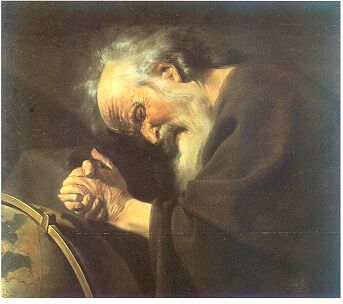 |
| Johannes Moreelse, Heraclitus (1630) |
They ask where everything comes from, and what being is, but end up coming to conclusions like “everything is fire.” Even that conclusion isn’t as strange as it sounds. Rather, it’s Heraclitus’ attempt to explain why change perpetually exists within the closed system of the universe. His reasoning was that it is the nature of fire to be in a perpetual state of flux, so perhaps the rest of the universe is simply fire in different phase changes. Smart reasoning, very wrong conclusion.
From their midst, a few philosophers emerge – namely, Socrates, Plato, and Aristotle – who start giving the right (or nearly-right) answer to one question after another. When the Gospel reaches the Greeks, it finds people who are both intellectually curious, and already convinced of many of the truths of Christianity. It’s little wonder that early Christians like Justin Martyr (100-165) should conclude that the Greek philosophers played the same role for the Gentiles that the prophets played for the Jews: to prepare them for the Gospel. Justin went so far as to say:
We have been taught that Christ is the first-born of God, and we have declared above that He is the Word of whom every race of men were partakers; and those who lived reasonably are Christians, even though they have been thought atheists; as, among the Greeks, Socrates and Heraclitus, and men like them; and among the barbarians, Abraham, and Ananias, and Azarias, and Misael, and Elias, and many others whose actions and names we now decline to recount, because we know it would be tedious.
Of course, all of this is a stark contrast to where post-Christian pagans have gotten. They started by giving the wrong answers to the right questions, and frequently fail to even ask the right questions: to the point of denying the existence of objective truth. The lights of intellectual curiosity appear to be dimming.
This isn’t to say that relativists didn’t exist among the Greeks: they did. Sophists like Patagoras argued that truth was relative, and the Sophistic school treated reason as subservient to rhetorical manipulation. But the Sophists was answered by Socrates and Aristotle, to such an extent that “Sophistic” comes down to us as an insult.
So what gives? The answer seems to be this: Plato and Socrates were one way that God prepared the Gentiles for the Gospel. But the post-Christian pagans have received the full light of the Gospel, and rejected it. There’s nowhere to go from there but down.
 |
| Raphael, School of Athens (detail) (1509) |
One of the major changes between Aristotle and Plato was this: Plato viewed the realest thing as the ideal. That is, he believed in what’s called the Theory of Forms, which goes something like this: various things may possess the same trait (like two numbers possessing “even-ness”). This points to the existence of a transcendent Ideal, or Form (in this case, the Form of Even-ness). Plato, who regarded the material world with great suspicion, viewed this transcendent Ideal as more real than the individual manifestations of it. So the Ideal of Green was truer than all of those things that we call “green.”
Aristotle rejected all of this, holding that the individual substance was the realest thing: a green leaf is more real than the abstract notion of green. The Renaissance painter Raphael captured this well in his massive painting School of Athens, depicting all of the great Greek philosophers of antiquity. At the center of the painting (see the image on the right) are Plato and Aristotle. Plato is pointing upward to his ideal forms: Aristotle counters by pointing forward to the things of the created world.
Why does all of this matter, from a Christian perspective? One reason is art. When Christians were heavily influenced by Platonism, they tended towards iconography, as an attempt to capture the Ideal of Christ. Instead of depicting a single scene from the life of Christ, the Icon would attempt to capture something broader. So, for example, the Christ Pantocrater icon depicts Christ as simultaneously a Merciful and Just Judge (and simultaneously God and Man) by giving Him different expressions on different sides of His Face.
As Western Christian philosophy became increasing Aristotelian, the artistic emphasis shifted as well. Instead of seeking to capture the Ideal or Form of Christ, art focused more on capturing specific events from the Life (or Death) of Christ. Benedict XVI explained all of this in Spirit of the Liturgy:
Platonism sees sensible things as shadows of the eternal archetypes. In the sensible we can and should know the archetypes and rise up through the former to the latter.
Aristotelianism rejects the doctrine of Ideas. The thing, composed of matter and form, exists in its own right. Through abstraction I discern the species to which it belongs. In place of seeing, by which the super-sensible becomes visible in the sensible, comes abstraction. The relationship of the spiritual and the material has changed and with it man’s attitude to reality as it appears to him.
For Plato, the category of the beautiful had been definitive. The beautiful and the good, ultimately the beautiful and God, coincide. Through the appearance of the beautiful we are wounded in our innermost being, and that wound grips us and takes us beyond ourselves; it stirs longing into flight and moves us toward the truly Beautiful, to the Good in itself.
Something of this Platonic foundation lives on in the theology of icons, even though the Platonic ideas of the beautiful and of vision have been transformed by the light of Tabor. Moreover, Plato’s conception has been profoundly reshaped by the interconnection of creation, Christology, and eschatology, and the material order as such has been given a new dignity and a new value. This kind of Platonism, transformed as it is by the Incarnation, largely disappears from the West after the thirteenth century, so that now the art of painting strives first and foremost to depict events that have taken place.
Thus, it should be no surprise that the shift from iconography to other forms of Christian art runs parallel (both geographically and temporally) to the shift from Platonism to Aristotelianism.
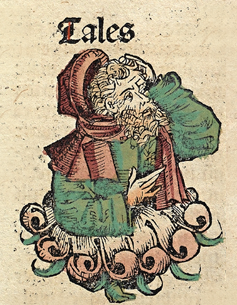 |
| Nuremberg Chronicle, Thales (1493) |

You said:
His reasoning was that it is the nature of fire to be in a perpetual state of flux, so perhaps the rest of the universe is simply fire in different phase changes. Smart reasoning, very wrong conclusion.
Uh, not really.
Hebrews 12:29
For our God is a consuming fire.
Acts 17:28
For in him we live, and move, and have our being; as certain also of your own poets have said, For we are also his offspring.
Exodus 3:14 And God said unto Moses, I Am That I Am: and he said, Thus shalt thou say unto the children of Israel, I Am hath sent me unto you.
God is not the universe. God is greater than the universe. But even the universe exists within God. Because God is all being. And our God, is a consuming fire.
Sincerely,
De Maria
De Maria,
I’m not sure exactly what you’re arguing. It looks like you’re trying to say that Heraclitus was right that the universe is made of fire? If so, you’re doing so by conflating metaphoric Scriptural imagery with literal fire. See I, 13, 6 of the Summa for how to understand the use of metaphorical imagery in Scripture, when applied to God (the senses in which we can, and can’t, describe God as a Rock, a Lion, etc.).
In this case, Heraclitus wasn’t trying to be poetic. He literally thought that everything in the universe was made of fire, and he was completely and undeniably wrong (I have trouble imagining that you’re actually contesting this, but you seem to be). The attribute of fire that convinced Heraclitus was that it was constantly in flux. And this attribute of fire isn’t found in God, Who is perfectly unchanging. So in that sense, God is quite unlike fire, and the analogy breaks down.
I.X.,
Joe
Joe,
You said,
I’m not sure exactly what you’re arguing.
I’m not arguing. Just making an observation.
It looks like you’re trying to say that Heraclitus was right that the universe is made of fire?
Was Heraclitus on fire when he said that? In other words, I’m assuming that the man who said that the universe is made of fire is speaking metaphorically. Just as I assume that the man who said that God is a consuming fire is speaking metaphorically. I don’t worship my furnace.
Or do you assume that Heraclitus was out of his senses? To me, he is saying that the universe has things in common with fire.
If so, you’re doing so by conflating metaphoric Scriptural imagery with literal fire.
So you do presume that Heraclitus was speaking literally? Can you prove this? It seems to me that a man who is considered a wise philosopher and who is not burning at the moment he says it, should be given the benefit of the doubt that he is speaking metaphorically when he says that the universe is a a fire.
But I’ve never heard of the man before you mentioned him so perhaps you can enlighten us as to why you believe he was speaking literally.
See I, 13, 6 of the Summa for how to understand the use of metaphorical imagery in Scripture, when applied to God (the senses in which we can, and can’t, describe God as a Rock, a Lion, etc.).
I don’t worship fires nor rocks. I know that God is all being.
I made a simple observation that this man actually came to a conclusion very close to what we believe. The only problem is that he ascribed it to the universe. Whereas we ascribe this description to God.
But I sense that this offended you somehow. At least, I don’t understand why you have directed me to study the difference between God and a rock.
The problem, I think, is that you have taken literally that which a pagan philosopher intended to be taken metaphorically. In the very same sense, in fact, as we understand the nature of God.
Sincerely,
De Maria
@De Maria
Concerning Heraclitus, he was indeed being literal about the universe being made of fire. As with most natural philosophers of his era, he thought that there were four Elements that constituted all things: Earth, Air, Fire, and Water. Numerous thinkers of his time, like Thales, proposed that the cosmos was composed primarily of Water as the primary element or principle of things; others, like Anaximenes, proposed Air as the primary principle – they proposed that Air was modified by thinning or thickening into fire, winds, clouds, water, and earth. Heraclitus, because of what he believed Fire to be (i.e. essentially characterized by constant flux and change, as the sensible world evidently was), instead proposed Fire because it seemed to fit.
It may seem an incredibly hypothesis to us now, but given the state of physical theory in the days of the Pre-Socratics, it is in nowise surprising. Thales, Anaximander, Heraclitus, and their contemporaries were all at the very start of what we might call philosophy (specifically natural philosophy, which is close to what we now call the special sciences) and as such were only beginning to feel their way through physical theories. This is not to denigrate them or their work – many of the Pre-Socratics introduced problems in philosophy that last even to this day – but they were indeed bounded by the limits of their knowledge and circumstances.
Hope that clarified things!
Hi Aloysius,
That may be your opinion, but it doesn’t make sense to me. And unless you can provide some proof that the man was not speaking metaphorically or analogously, I will hold my own opinion on the matter.
1. You seem to be contradicting yourself. If Heraclitus thought the the universe were literally made of fire, how do the other three elements fit in?
2. You are describing an analogy when you say:
“Heraclitus, because of what he believed Fire to be (i.e. essentially characterized by constant flux and change, as the sensible world evidently was), instead proposed Fire because it seemed to fit.”
Seemed to fit? That doesn’t sound like literal belief. That sounds like analogy.
Constant flux and change are attributes of fire. But they are not fire itself. Therefore, if he believed the universe had these attributes in common with fire, that does not make it a literal belief that the universe is actual fire.
3. Here is what another website says about Heraclitus belief:
An eternal fire: For whatever reason, Heraclitus believed that the universe was an eternal fire (see Fire). The universe did not come into existence, nor will it ever go out of existence. Even though he believed in God/gods as did Homer and Hesiod, he did not think the gods created the universe. The universe remains in its logical ordering, with all of its changes being regulated measure for measure.
Does that sound familiar to you? We believe that our God is an eternal fire which did not come into existence and will never go out of existence. Is this not true?
Do you worship fire? I don’t.
a. Fire is not eternal. Therefore, according to this website, his belief can only be considered analogous.
b. Bringing us back to the fact that this is another ancient philosopher who came very close to the same conclusion as that of Biblical revelation about the nature of God.
4. What I see here is a sort of demeaning attitude towards the ancients which tends to devalue their mental capacity simply because they have a different set of values or because we assume we are so far more advanced than they.
5. So, I repeat, unless the man were standing in the midst of fire or a complete lunatic, I don’t believe there is any possible way that he could have been speaking literally.
Sincerely,
De Maria
De Maria,
Aloysius’s not contradicting himself, and he’s right. Nor is it a matter of “opinion”: we’re talking about well-established historical facts. The Greeks believed that there were four elements (fire, water, earth, and air) that comprised everything. There were then attempts to determine if these were all unified somehow, as a single element. It’s not radically different from what scientists do today with the fundamental forces: they articulate several, but have reason to believe that they may all be one.
Or to use a simpler example, we believe that water vapor, a glass of water, and an ice cube are really one thing in different states. That’s the view that Heraclitus had of everything: that it was different phase changes of fire. He said so: “All things are an interchange for Fire, and Fire for all things, just like goods for gold and gold for goods.” (Fragment DK B90). More specifically, he taught that “The death of fire is the birth of air, and the death of air is the birth of water” (DK B76). And: “The transformations of Fire: first, sea; and of the sea half is earth, half whirlwind … Sea pours out, and is measured by the same amount as before it became earth” (DK B31). So no, he wasn’t speaking metaphorically: nor was he, by any means, that only Pre-Socratic thinker to attempt to unify all matter as a form of one element.
I’m also not sure why you find this condescending. It was from these attempts that we got the idea of units (called “atoms”) making up all of matter, although that particular contribution came from Democritus, not Heraclitus.
I.X.,
Joe
Joe, you said:
So no, he wasn’t speaking metaphorically:….
To me that sounds as though he is using the word “fire” to mean “energy”. And that would be a very astute observation in my opinion. Have you ever heard the saying, “E=mc squared”?
In the meantime, if he considered the universe to be a literal fire, it is at the very least a very unique type of literal fire. One which is invisible to the naked eye, doesn’t burn everything, which doesn’t create smoke, which was not created and will not die out. If this is what you consider a literal fire, have at it. But it doesn’t fit in my head that because he used the word, “fire” to describe the universe, you should consider it a “literal:” fire. Or perhaps you and I have a different understanding of the word, “literal”.
Sincerely,
De Maria
De Maria,
At this point, you appear simply unwilling or incapable of admitting that you were mistaken.
I.X.,
Joe
Mistaken about what, Joe? You insist that this man was speaking literally about something which does not even remotely fit the definition of literal.
But this is not Catholic Doctrine and I don’t really care one way or the other. But answer this for yourself. Have you ever seen or heard of a “literally” eternal fire? If you have, then you are right. I haven’t, therefore it falls under the category of a metaphor to me.
Why does this seem to upset you?
Sincerely,
De Maria
De Maria,
I’m not upset – this debate just seems needless, since it’s over pretty well established facts. The Greeks believed in four Elements: earth, fire, wind, and water. But they wanted to know how all of being was one. Several of their philosophers, including Heraclitus, advanced the theory that the other three elements were simply different forms of the First Element.
You say that it “does not even remotely fit the definition of literal,” but you’re wrong. They weren’t being poetic here. Heraclitus, like Anaxagoras, Democritus, and several of the other Pre-Socratics, were attempting science (or perhaps more precisely, natural philosophy). They literally thought that all of the elements could be explained as different forms of the First Element: or in Democritus’ case, as different shapes of atoms.
You say that there’s no such thing as a literally eternal fire, and that’s true, but that’s why Heraclitus was wrong. And you’re right that the universe isn’t burning, but that’s not much of an objection. You can’t swim in solid ice or water vapor, but that doesn’t disprove that they’re (literally) water.
If you think that Heraclitus and his peers were just being poetic, why not read up on the subject first, and see if you can find philosophers who support your view?
I.X.,
Joe
Joe HeschmeyerMay 28, 2013 at 6:34 PM
De Maria,
I’m not upset – this debate just seems needless, since it’s over pretty well established facts.
How is this a fact? If anything, that might be considered a well established opinion. But unless someone talked to Heraclitus and got him to say that the universe is “literally” a fire, they can only opine on what he meant.
The Greeks believed in four Elements: earth, fire, wind, and water. But they wanted to know how all of being was one. Several of their philosophers, including Heraclitus, advanced the theory that the other three elements were simply different forms of the First Element.
Still sounds very much like E=MC squared. Energy = Matter x some constant squared.
You say that it “does not even remotely fit the definition of literal,” but you’re wrong.
I disagree. I believe you are wrong.
They weren’t being poetic here. Heraclitus, like Anaxagoras, Democritus, and several of the other Pre-Socratics, were attempting science (or perhaps more precisely, natural philosophy). They literally thought that all of the elements could be explained as different forms of the First Element: or in Democritus’ case, as different shapes of atoms.
According to Einstein, Energy is matter transformed. And matter is energy transformed. Yet energy is not matter. And matter is not energy.
You say that there’s no such thing as a literally eternal fire, and that’s true, but that’s why Heraclitus was wrong.
That is why he was speaking metaphorically.
And you’re right that the universe isn’t burning, but that’s not much of an objection. You can’t swim in solid ice or water vapor, but that doesn’t disprove that they’re (literally) water.
I didn’t say that water isn’t ice nor that water isn’t vapor in another state of being. I said that Heraclitus must have been speaking metaphorically when he said that the universe was fire.
And I did say that it is very astute of Heraclitus to compare the universe to fire. 2400 years later, another man, Einstein, made the observation that matter becomes energy and energy becomes matter and that we can see this process occurring in a fire.
If you think that Heraclitus and his peers were just being poetic,
I never said poetic. I said metaphorically or analogously. He was making observations about the universe which he was trying to understand and speaking about new discoveries and ideas using terminology which he recognized and understood.
why not read up on the subject first, and see if you can find philosophers who support your view?
Joe, it doesn;t bother me that you have a different opinion on this matter than mine. Nor do I care if anyone else holds my view. If the emperor has no clothes, the emperor has no clothes, no matter how many people tell him that he is dressed.
I.X.,
And also with you,
Sincerely,
De Maria
Perhaps, we can agree to disagree on this matter. After all, it is the Church which teaches unity in necessary things, liberty in unnecessary and charity in all.
I don’t see Heraclitus beliefs or opinions as Catholic Doctrine nor particularly necessary to understanding the Catholic Faith, do you?
Sincerely,
De Maria
“Beware lest any man spoil you through philosophy and vain deceit, after the tradition of men, after the rudiments of the world, and not after Christ.” Col. 2:8 KJV.
Ask yourself why your religious superiors insist that you waste so much time studying pagan sodomites when you could have been learning the words in the Holy Bible instead.
1) Yes, many Greeks were sodomites. They were sinners. So were Matthew, Mark, Luke, John, and Paul. So am I. So are you.
2) The philosophy being condemned is vain, deceitful philosophy – not all philosophy. “See to it that no one captivate you with an empty, seductive philosophy according to human tradition, according to the elemental powers of the world and not according to Christ.” Col. 2:8 The NAB translation shows this more clearly. Thus Paul is not suggesting we cannot study philosophy ordered to theology, but is warning us not to allow philosophy to “captivate” us (i.e. philosophy as an end in and of itself). The study of philosophy enables men to fulfill the commandments to “love the Lord, your God, with… all your mind” Luke 10:26 and to “always be ready to give an explanation to anyone who asks you for a reason for your hope.” 1 Peter 3:15.
3) Your argument turns on a false dichotomy as we can study both the Bible and philosophy.
4) Your argument, as all arguments must, depends on a branch of philosophy, logic. Therefore you are attempting to philosophize about how we shouldn’t philosophize, which is absurd.
5) Lastly, I’ll leave you with a quote from C.S. Lewis, “Good philosophy must exist, if for no other reason, because bad philosophy needs to be answered.”
Mack said:
Ask yourself why your religious superiors insist that you waste so much time studying pagan sodomites when you could have been learning the words in the Holy Bible instead.
1 Thessalonians 5:21
King James Version (KJV)
21 Prove all things; hold fast that which is good.
Philosophy is a waste of time: “Cease, my son, to hear the instruction that causeth to err from the words of knowledge.” Proverbs 19:27 KJV.
Philosophers don’t have anything worthwhile to add to the scriptures:“But where shall wisdom be found? and where is the place of understanding? Man knoweth not the price thereof; neither is it found in the land of the living.” Job 28:12-13 KJV.
In Christ alone “…are hid all the treasures of wisdom and knowledge.” Col. 2:3 KJV.
Seeking wisdom (Genesis 3) damned humanity, and so “by wisdom” man became ignorant of God: “Where is the wise? where is the scribe? where is the disputer of this world? hath not God made foolish the wisdom of this world? For after that in the wisdom of God the world by wisdom knew not God, it pleased God by the foolishness of preaching to save them that believe.” 1 Corinthians 1:20-21 KJV.
“For the wisdom of this world is foolishness with God. For it is written, He taketh the wise in their own craftiness.” 1 Corinthians 3:19 KJV.
The young Catholic priests are given years of worldly garbage to learn so that they become ignorant of scriptures, rely upon human wisdom, develop embarrassment about taking the Bible literally, and become moral relativists who accept the authority of men instead of God’s word. This curriculum compliments Catholic tradition very well, whereas the study of the holy scriptures would lead to rebellious priests who think like protestants. The system is designed to perpetuate itself, not to make good ministers of Jesus Christ.
Mac said:
Philosophy is a waste of time: “Cease, my son, to hear the instruction that causeth to err from the words of knowledge.” Proverbs 19:27 KJV.
Philosophers don’t have anything worthwhile to add to the scriptures:”
By condemning all philosophers, you condemn Jesus Christ. The Catholic Church recognizes that Jesus Christ is the greatest philosopher that ever existed. So much so that everything which He said, was added to the Scriptures by the Catholic Church.
The young Catholic priests are given years of worldly garbage to learn so that they become ignorant of scriptures, rely upon human wisdom, develop embarrassment about taking the Bible literally,
On the contrary, it is so they can recognize the Spirit of Wisdom which blows where it will and which can be found amongst every group of people on earth. For we are all made in God’s image:
Acts 17:24 God that made the world and all things therein, seeing that he is Lord of heaven and earth, dwelleth not in temples made with hands; 25 Neither is worshipped with men’s hands, as though he needed any thing, seeing he giveth to all life, and breath, and all things; 26 And hath made of one blood all nations of men for to dwell on all the face of the earth, and hath determined the times before appointed, and the bounds of their habitation; 27 That they should seek the Lord, if haply they might feel after him, and find him, though he be not far from every one of us: 28 For in him we live, and move, and have our being; as certain also of your own poets have said, For we are also his offspring.
Sincerely,
De Maria
Mack,
1) Philosophy, as I noted in the original post, is the love of wisdom. You can’t be a Christian and hate Wisdom. Christ is Wisdom from God (1 Cor. 1:30). See also the odes to wisdom found in Proverbs 8, Job 28, etc. (Honestly, I think Proverbs 8, in isolation, shows the folly of your position).
Scripture condemns bad (and therefore, false) philosophy and wisdom. But true wisdom is from above, and is presented to us that we may love it. James 3:13-17 expressly distinguishes between the two of them. For you to condemn all wisdom is to go directly against Scripture.
The Book of Proverbs states that its purpose is “that men may know wisdom and instruction” (Proverbs 1:2). A few chapters later, it says “Happy is the man who finds wisdom, and the man who gets understanding, for the gain from it is better than gain from silver and its profit better than gold” (Proverbs 3:13-14), and “The Lord by wisdom founded the earth” (Proverbs 3:19).
If your religious system is threatened by wisdom and philosophy, that may be a sign of its incoherence and intellectual weakness.
2) Your whole argument is that all true wisdom comes from Christ (true), and therefore, it comes from Scripture (false). I see this error frequently among Protestants, but it is both without foundation, and directly contrary to what Scripture says. For example, in Romans, St. Paul says that the Gospel had already reached the Gentiles. He says that:
a) The created world reveals truth (including God) to the pagans (Romans 1)
b) Conscience acts as the voice of God, and a Law that will condemn or exonerate Jews and Gentiles alike (Romans 2)
c) The pagans have already heard “the preaching of Christ” (prior to hearing Scripture proclaimed), because of natural law (Romans 10:17-18 — to see what he is saying, you have to recognize that he is quoting Psalm 19:4).
3) Tou asked why we care about philosophy. The same reason that the earliest Christians care about philosophy. Because good philosophy is a preparation for the Gospel, and good philosophy is important for explaining the Gospel.
4) By the way, St. Paul quotes philosophers, like Epimenides of Knossos. John uses the language of philosophy to describe Christ (calling him the Logos). So perhaps the better question is how you justify rejecting this.
5) Do you accept the Trinity? And if so, do you accept the Christian formulation of it, as Three Hypostases in One Ousia?
I.X.,
Joe
Because if you don’t know what the Devil does you won’t be able to attack it properly.
Ask yourself, do you have enough intelligence and knowledge to exegete every passage of scripture perfectly?
Joe, thank you for writing such wonderful pieces. They enrich my day very much. The Church Christ founded will get a wonderful priest. Peace to you.
teomatteo
Thank you for sharing your journey with us – be assured of many of us all around the world who are continuously praying for you and your fellow learners on your respective journeys toward priesthood and the religious life – keep up the good work!
ps – yes, the Divine Office it is a real treasure of the church – there is just nothing more beautiful than chanting it together in communion with the whole worldwide church before dawn or evening mass – Thanks be to God truly!
oopss sorry – I am Felix Kong, from Kuala Lumpur, Malaysia.
Thank you – I love hearing from international Shameless Popery readers!
Raphael’s “School of Athens” is even deeper in person, because one can see the painting on the opposite wall depicting the Saints adoring the Blessed Sacrament and writing about it, illuminating Raphael’s work by fulfilling the expectations of the ancient philosophers.
You might want to look into praying the older Divine Office instead of the Pauline Liturgia Horarum. It takes a little more time, but it is very fulfilling to pray all the psalms in a week and the older hymns (save Urban VIII’s savage “improvements” to some of them).
I spent a good chunk of last week at Clear Creek Abbey in Oklahoma, doing just that. I like both Forms, and both “takes” on the Divine Office. I see clear advantages to both Matins and Office of Readings, which is the big change.
I.X.,
Joe
Excellent post.
“5. The Pre-Christian Pagans Got Much Further than Post-Christian Pagans Can Ever Hope To”
Gotta take a minor issue with this one. From my view of ancient history, and modern history, There is no such thing as “Post-Christian anything“. There is pre-Christian paganism, or there is Christianity.
There is nothing “after Christianity”. Everything that has tried to fill that role, has either totally collapsed, or is in the process of collapsing. If people give up Christianity, as sadly the West is doing, and has done in many locations, paganism, with its lack of respect for human life, and human dignity, will fill that void.
Which in itself is terrifying for the future, as people in the West today have no idea of what true Paganism is. Pre-Christian paganism, shown in the full light, would be terrifying to modern eyes. Imagine the screams of thousands of people being crucified, imagine the screams of thousands of people being enslaved, the hearts of thousands of people being cut out, imagine the roar of the crowds as people were fed to lions, the list goes on. Christianity got rid of those insane pagan practices in a few hundred years, and there’s no reason why those insane things can’t come back in a few hundred years more.